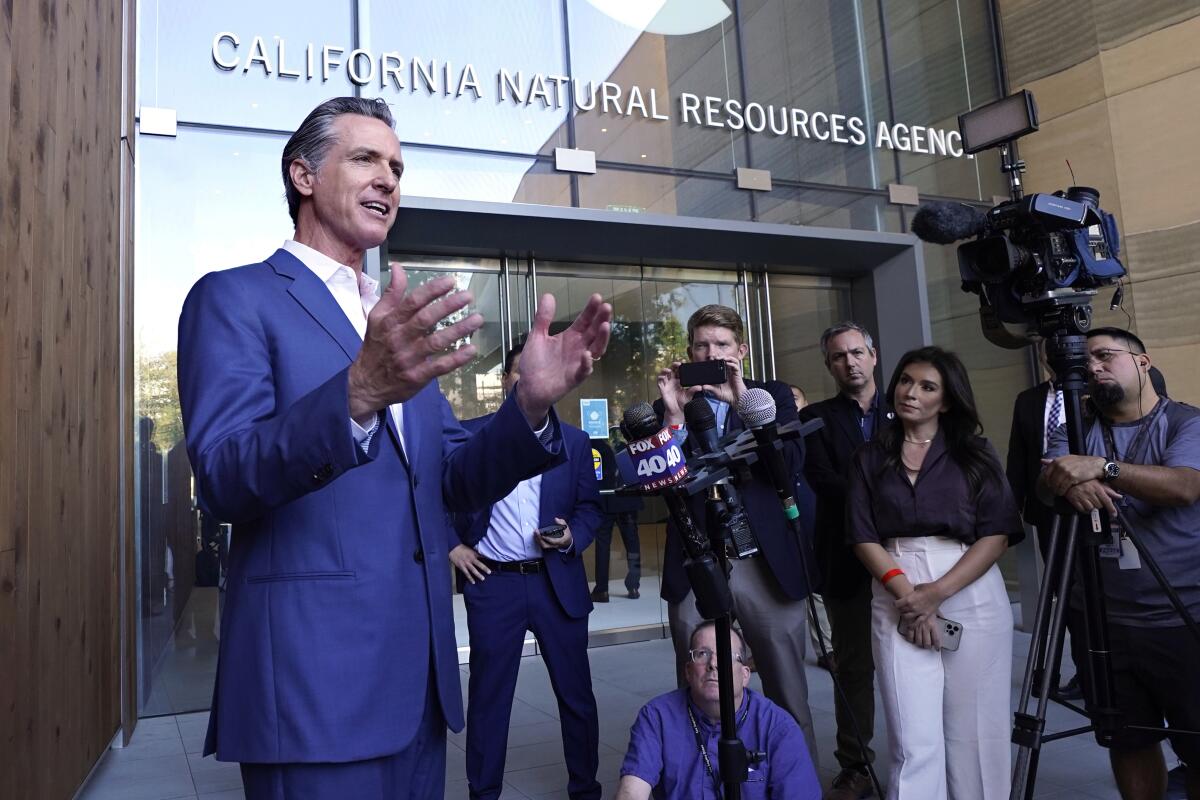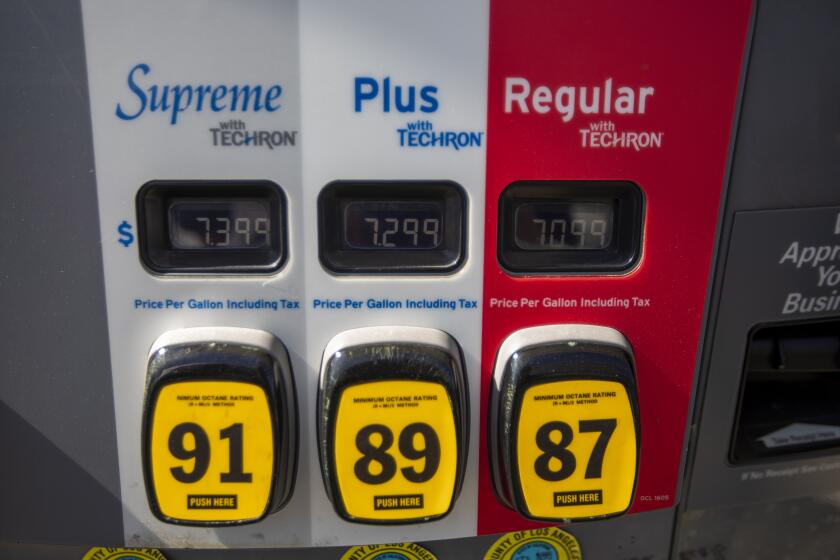Newsom calls special legislative session to consider tax on excess oil company profits

- Share via
SACRAMENTO — Gov. Gavin Newsom on Friday announced he is calling a special legislative session in December for lawmakers to consider passing a tax on excessive profits oil companies are making because of the increase in California gas prices.
Newsom said he is working with the leadership of the Democratic-controlled Legislature to determine the best way to tax the profits and return that money to Californians getting stung every time they fill up their gas tanks.
“This is just rank price gouging. They can get away with it,” Newsom told reporters during a news conference in Sacramento. “They’re taking advantage of you, every single one of you, every single day. Hundreds of millions of dollars a week they’re putting in their pockets, lining their pockets at your expense, and then polluting this planet and leaving us all the external realities and costs associated with that.”
Newsom said there is no logical explanation for why gas prices in California are $2.50 a gallon higher than the national average. He dismissed speculation that it was because of refineries in the state undergoing maintenance, calling that “nonsense” because the work at oil plants occurs every year without causing such a major price disparity between California and the rest of the nation.
At least five plants have recently faced maintenance-related stoppages or slowdowns, reducing supplies of California’s special blend of gasoline mandated to reduce pollution.
Unlike the nationwide increase in gasoline costs over the summer — driven by high oil prices and a surge in travel — the recent spike is unique to California and some of its Western neighbors, underscoring the fragility of the state’s transitioning energy markets.
Oil prices had a robust summer but had begun declining before OPEC+ announced plans this week to reduce output, which sent oil futures to their biggest weekly gain since March. West Texas Intermediate, the U.S. benchmark, jumped 4.7% to settle at $92.64 per barrel Friday. Brent crude, the international standard, rose 3.7% to settle at $97.92. Both are down from June, when futures contracts traded above $122 a barrel.
The summer’s high prices left oil companies swimming in profits, with Exxon Mobil and Chevron Corp. both reporting record income for the second quarter.
The new California ‘tax refund’ isn’t really a tax refund. But what is it? The uncertainty is why the taxability question is hard to answer.
“We’re gonna get every dollar, every cent back in the pockets of those who were fleeced,” Newsom said. “It’s all about short-term profits, extracting money from people at a time of stress and inflation. I think that’s pretty damn disgraceful, and the question for all of us is which side are we on?”
The special legislative session on the oil tax will begin Dec. 5, when lawmakers are already scheduled to reconvene in Sacramento after the November midterm election.
Newsom said he did not want to call legislators back to the Capitol before that because his administration needs time to explore options for taxing oil profits, especially since he expects a fierce legal battle with mammoth, billion-dollar petroleum companies.
Newsom said his administration is reviewing similar excise taxes on oil that are in place in Europe, as well as a windfall tax on oil profits being considered in Washington.
“We mean business and, if they don’t believe it, they’re about to find out,” Newsom said.
Senate President Pro Tempore Toni Atkins (D-San Diego) and Assembly Speaker Anthony Rendon (D-Lakewood) issued a joint response saying they look forward to seeing the governor’s proposal. They also noted that starting Friday, eligible Californians began receiving tax refunds of $200 to $1,050 under a budget deal between the Legislature and governor to address high gas prices and the steep rise in inflation.
“The gas rebates that are beginning to roll out today to Californians were a huge step in helping ease the brunt of rising fuel costs, and we will continue to examine all other options to help consumers,” they said in a statement. “A solution that takes excessive profits out of the hands of oil corporations and puts money back into the hands of consumers deserves strong consideration by the Legislature.”
Kevin Slagle, spokesman for the Western States Petroleum Assn., called Newsom’s announcement a “political stunt,” saying if Newsom believed this was a crisis he would have called for a special session before the November election.
He also criticized the governor’s package of climate bills passed by the Legislature this year, including mandating health and safety buffer zones around all new oil and gas wells, saying those will put an even greater financial burden on taxpayers.
“It was just over a month ago that the governor and the Legislature got together and imposed a series of mandates and regulations that will cost Californians a record $54 billion. These are the types of actions that can drive consumer costs way up,” Slagle said. “A better use of the special session would be to take a hard look at decades of California energy policy and what they mean to consumers and our economy.”
California Energy Commission Chair David Hochschild said in a statement Wednesday that the data show even as crude oil prices decreased and state fees and taxes remained unchanged, the price at the pump still went up because refinery costs and profits more than tripled.
Hochschild has requested information from California oil refineries that typically produce most of the gas used in California, saying he wants an explanation about the “sudden gap between national and California prices.”
In a response, Valero and PBF Western Energy, which each run two gasoline refineries in California, denied any price gouging or market manipulation and instead blamed the state’s many environmental regulations and energy policies — calling California the most expensive state to operate in.
Scott Folwarkow, vice president of state government affairs for Valero, said the cost of any new tax would ultimately be passed on to California consumers.
Times staff writers Nancy Rivera Brooks and Grace Toohey contributed to this report.
More to Read
Sign up for Essential California
The most important California stories and recommendations in your inbox every morning.
You may occasionally receive promotional content from the Los Angeles Times.















